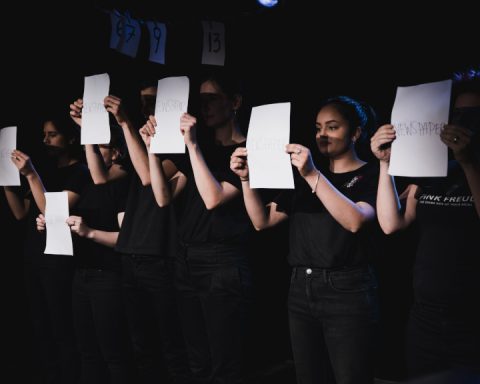Watching Proof in a sold out venue – the theatre of Leipzig’s Neues Schauspiel – had its merits in terms of entertainment and cultural experience. But was the play any good and will it be worth attending next Saturday? You’ll find out here.
As the theatre play opens on the back porch of a clapboard house in the Chicago suburbs, Catherine (Abigail Akavia) is taking in the evening air, listening to the crickets to soothe her insomnia. She is joined by her father Robert (Andrew Wells), and we come to understand that there’s more to this relationship than the simple love and affection that exists between a parent and a child.

Catherine and Robert have a kindred spirit that seems to extend beyond normal family bonds.
Robert died the previous week and Catherine is preparing to bury him. His spirit has returned to her to somehow convince her that she will not suffer his fate and she must get on with her life. Intriguingly so, we learn that their passion rests upon mathematics and a common bond of mental illness. Catherine prevented her mentally ill father – and maths prof – from being institutionalized. No doubt this offered him a better quality of life, but she also sacrificed many of her own ambitions for his care and maintenance.
Enter Hal (Felix Kerkhoff), one of Robert’s protégés, who searches through stacks of Robert’s notebooks for some little nugget of mathematical genius. While Catherine assures him the notebooks contain mere nonsensical drivel, he won’t trust her judgment and we get to observe the battle lines being drawn. There is obviously a magnetic effect between them, but attraction and repulsion are two sides of the same coin.
Arriving for the funeral the next day, Claire (Jelena Stojković), the other sister, quickly tries to take control of the situation and organize things her own way. Though providing vital financial support for her father and sibling, she lives in New York with her fiancé and has no understanding of the day-to-day struggles here. A self-appointed alpha, she is now determined to make up for years of emotional indifference by providing her sister with a soft place to land, or, in Catherine’s view, a padded cell.
Proof confronts a number of different issues we all are required to face at some point in today’s society.
First, as the older generation ages and the newer scatters with the wind, there’s the issue of how we should care for the older generation. Do we submit them to a care home and a mental (and emotional) wasteland, or do we take it upon ourselves to provide care and face physical and emotional exhaustion? Does Catherine do the right thing when taking care of her father, suffering the emotional pain of watching a loved one slowly wither and die?
Catherine’s own expert abilities are put into doubt in a field dominated by men. The latter find it hard to set prejudices aside to accept Catherine’s brilliance, and hence need to understand the proof and its origins by setting aside male bias. And since Catherine is an object of affection and sexual desire, the big question remains whether she can eventually be acknowledged when she entrusts us with her own genius work.
As observers in the theatre, we come to understand the difficulties she is facing and the angst of suffering the same fate as her father.
The chemistry between Catherine and Hal was palpable. Like two porcupines circling each other in a mating dance, you can feel the hurt they are risking as they expose their inner thoughts. The calmness displayed by Hal in this romantic interlude through the more subtle movement was captivating. The trust she then gives him is earned, making the perceived betrayal later that much more poignant.
In the meantime, Robert’s mantel of professorial respectability is donned quite appropriately. Not just lecturing, he can also tease out the correct conclusions from others. Although he mostly acts as a sounding board for others, we can still observe his awareness of his own loss of control.

Claire plays the proverbial bull in a china shop. Submission to her will is predestined by word and deed.
Hannes Flor, taking the theatre director’ chair for the first time at English Theatre Leipzig, lets the play unfold at a leisurely pace. While the actors’ movements on the stage seemed almost frenetic at times, the dialogue never rushed along.
By redirecting the actors’ energy, a great story is told in a very tangible way. The stage exudes that American back-porch atmosphere and exposes the intrinsic elements to the story line which are both timely and universal.

We’ve been told that Friday’s show is already sold out, but there are still tickets available for the show on Saturday, 15 September.
Cover shot courtesy of English Theatre Leipzig.









